新视野英语教程2 教案
- 格式:docx
- 大小:18.21 KB
- 文档页数:6
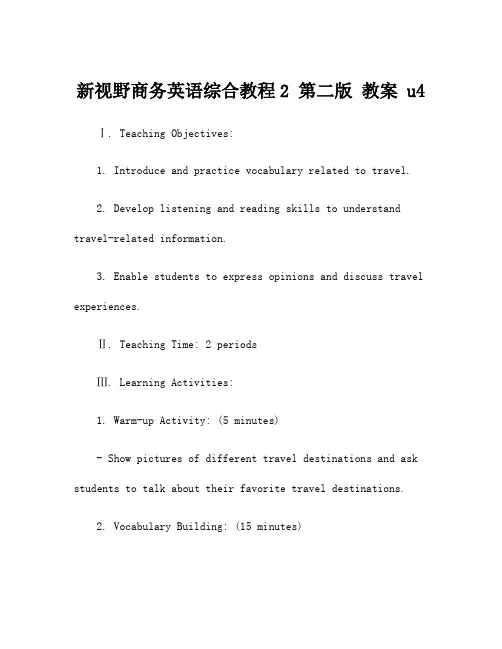
新视野商务英语综合教程2 第二版教案 u4Ⅰ. Teaching Objectives:1. Introduce and practice vocabulary related to travel.2. Develop listening and reading skills to understand travel-related information.3. Enable students to express opinions and discuss travel experiences.Ⅱ. Teaching Time: 2 periodsⅢ. Learning Activities:1. Warm-up Activity: (5 minutes)- Show pictures of different travel destinations and ask students to talk about their favorite travel destinations.2. Vocabulary Building: (15 minutes)- Present and explain new vocabulary related to travel using visual aids and examples.- Words: itinerary, brochure, currency, tourist attraction, accommodation, landscape, souvenir, expedition, destination, jet lag, shuttle bus, check-in, boarding pass.3. Listening Comprehension: (20 minutes)- Play an audio recording of a travel agent discussing vacation packages.- Students listen and answer multiple-choice questions based on the information provided.- Discuss the correct answers as a class.4. Reading Comprehension: (25 minutes)- Distribute reading passage about a travel blogger's trip to an exotic destination.- Students read the passage silently and then answer comprehension questions.- Review the answers as a whole class activity.5. Group Discussion: (15 minutes)- Divide students into small groups of 4-5.- Each group discusses the following questions:a) What factors do you consider when planning a trip?b) What are some of the benefits and drawbacks of traveling alone vs. traveling with a tour group?c) Share one memorable travel experience you have had and explain why it was significant.6. Vocabulary Practice: (10 minutes)- Conduct a vocabulary matching activity where students match travel-related words with their definitions.- Use flashcards or PowerPoint slides to display the words and definitions.- Check and discuss the answers as a class.7. Speaking Activity: (20 minutes)- In pairs, students interview each other about their dream travel destinations.- They should ask questions like "Where would you like to go? Why?", "What kind of activities would you like to do there?", and "When would be the ideal time to visit?"- Encourage students to provide detailed information and express their preferences.8. Homework Assignment: (5 minutes)- Ask students to write a short paragraph describingtheir most memorable travel experience.- They should use the vocabulary and phrases learned in class to describe the destination, the activities they did, and how it impacted them.Ⅳ. Supplementary Materials:1. Audio recording for listening comprehension activity.2. Reading passage for reading comprehension activity.3. Vocabulary flashcards or PowerPoint slides.。
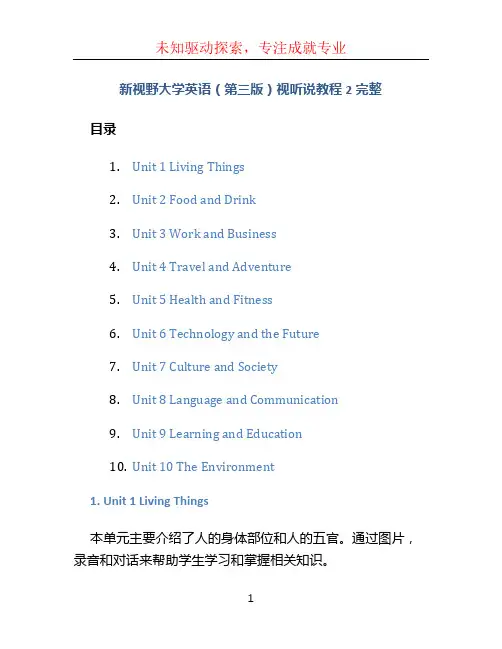
新视野大学英语(第三版)视听说教程2完整目录1.Unit 1 Living Things2.Unit 2 Food and Drink3.Unit 3 Work and Business4.Unit 4 Travel and Adventure5.Unit 5 Health and Fitness6.Unit 6 Technology and the Future7.Unit 7 Culture and Society8.Unit 8 Language and Communication9.Unit 9 Learning and Education10.Unit 10 The Environment1. Unit 1 Living Things本单元主要介绍了人的身体部位和人的五官。
通过图片,录音和对话来帮助学生学习和掌握相关知识。
1.1 Vocabulary本节重点介绍了身体部位的英文单词,并给出了对应的汉语翻译和发音示例。
单词包括head, face, eye, ear, nose, mouth, arm, hand, leg, foot等。
1.2 Sentence Patterns本节介绍了身体部位的描述方式,涵盖了be动词、形容词和名词的搭配用法。
例: - His eyes are blue. - She has long hair.1.3 Conversations本节通过一些对话情景,帮助学生了解和使用相关词汇和句型。
对话涉及到日常生活中的身体部位描述,如询问别人的身体部位、谈论自己的身体健康等。
例: - A: Where is your nose? B: My nose is in the middle of my face.1.4 Listening通过录音材料,学生可以听到一些关于身体部位的介绍和描述,同时练习听力理解和跟读。
1.5 Speaking通过与同学进行小组讨论或角色扮演的方式,学生可以运用所学内容进行口语表达。
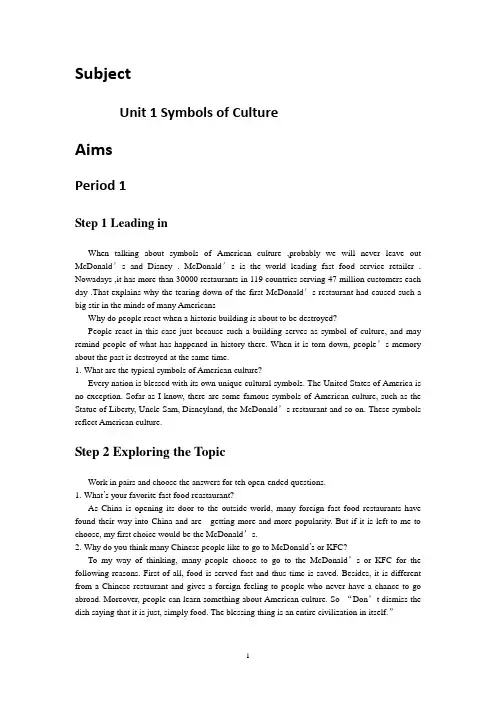
SubjectUnit 1 Symbols of CultureAimsPeriod 1Step 1 Leading inWhen talking about symbols of American culture ,probably we will never leave out McDonald′s and Disney . McDonald′s is the world leading fast food service retailer . Nowadays ,it has more than 30000 restaurants in 119 countries serving 47 million customers each day .That explains why the tearing down of the first McDonald′s restaurant had caused such a big stir in the minds of many AmericansWhy do people react when a historic building is about to be destroyed?People react in this case just because such a building serves as symbol of culture, and may remind people of what has happened in history there. When it is torn down, people’s memory about the past is destroyed at the same time.1.What are the typical symbols of American culture?Every nation is blessed with its own unique cultural symbols. The United States of America is no exception. Sofar as I know, there are some famous symbols of American culture, such as the Statue of Liberty, Uncle Sam, Disneyland, the McDonald’s restaurant and so on. These symbols reflect American culture.Step 2 Exploring the TopicWork in pairs and choose the answers for teh open-ended questions.1.What’s your favorite fast food reastaurant?As China is opening its door to the outside world, many foreign fast food restaurants have found their way into China and are getting more and more popularity. But if it is left to me to choose, my first choice would be the McDonald’s.2.Why do you think many Chinese people like to go to McDonald’s or KFC?To my way of thinking, many people choose to go to the McDonald’s or KFC for the following reasons. First of all, food is served fast and thus time is saved. Besides, it is different from a Chinese restaurant and gives a foreign feeling to people who never have a chance to go abroad. Moreover, people can learn something about American culture. So “Don’t dismiss the dish saying that it is just, simply food. The blessing thing is an entire civilization in itself.”Step 3 Background Information1. McDonald'sMcDonald's is the world's largest restaurant corporation with more than 30,000 restaurants in 119 countries serving 47 million customers each day. In the United States, there are more than 5,000 McDonald's restaurants. It serves some of its favorite foods—world-famous French fries, Chicken McNuggets (大鸡块) and so on. The largest McDonald's restaurant is located in Beijing, China. This restaurant has 1,000 employees. Also, up to 700 customers can sit and eat in this restaurant at one time.2. Ray KrocRaymond Albert Kroc was the founder of the McDonald's Corporation. Brothers Mac and Dick McDonald opened the first fast food restaurant called McDonald's in 1953 in Downey, California. In 1955, Kroc, a milkshake (奶昔) salesman went to visit the restaurant. He saw the potential of this fast food business and thus persuaded the brothers to sell the name to him. In this way, Kroc opened the first store of the McDonald's Corporation in 1955 in Illinois. Kroc died in the 1980's.3. Dick and Mac McDonaldIn 1953, the McDonald brothers—Dick and Mac—developed a new idea for their restaurant. The brothers called their idea a "drive-in" restaurant, and customers could order food from their cars. The restaurant also cut down on the number of choices on the menu, so the cooks could make the food very quickly. The restaurant specialized in making hamburgers, French fries, and chocolate shakes. In 1955, Ray Kroc visited the restaurant and offered to buy the rights to the two brothers' idea. The two brothers agreed, and the McDonald's restaurant chain was born.4.Walt Disney CompanyIt was formerly (1929-1986) known as Walt Disney Productions. It is an American corporation that was the best-known provider of family entertainment in the 20th century. It is getting even more popular now.5.Walter Elias DisneyWalter Elias Disney was born in Chicago, Illinois, in 1901. He was famous as a pioneer of animated cartoon films and as the creator of such cartoon characters as Mickey Mouse and Donald Duck. Walt produced such animated classics as Snow White and the Seven Dwarfs, Pinoccho, and Dumbo. He also planned and built Disneyland, a huge amusement park that opened near Los Angeles in 1955. During his lifetime Disney won a record of 30 Academy Awards and had been named among the most successful American entrepreneurs. Walt Disney died on December 15, 1966.6.DisneylandIn the early 1950s Disney had started plans for a huge amusement park to be built near Los Angeles. When Disneyland opened in 1955, it soon became a place of great attraction for tourists from around the world. It is called “the Happiest Place on Earth”because of its fantasy, imagination and magical entertainment.7.Disney WorldWalt Disney World opened near Orlando, Florida, in 1971. It is the most popular theme park in the world; it draws over 40 million visitors annually. It is modeled as a utopian city of leisure. It is represented by personalities from Disney animation and operated by 26,000 employees.Step 4 Warm upHere is the typical food sold in McDonald’s.巧克力圣代Chocolate Sundae 巨无霸Big Mac麦乐鸡Chicken McNuggets麦辣鸡翅Spicy Chicken Wings 草莓奶昔Strawberry Shake 大薯条arge Fries中薯条Medium Fries小薯条Small FriesStep 5 New Words and Expressions1. danger n. 危险e.g. John should have been aware of the danger of smoking to his health.约翰本该知道吸烟对健康的危害.Exercises警察在值勤的每分钟都可能遇到危险。
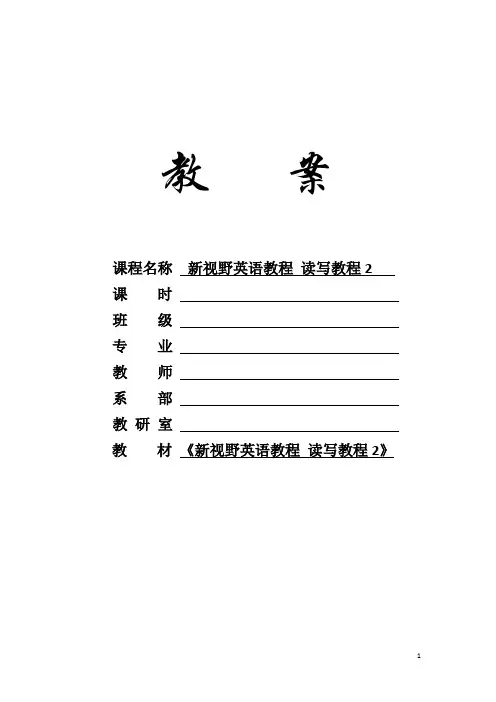
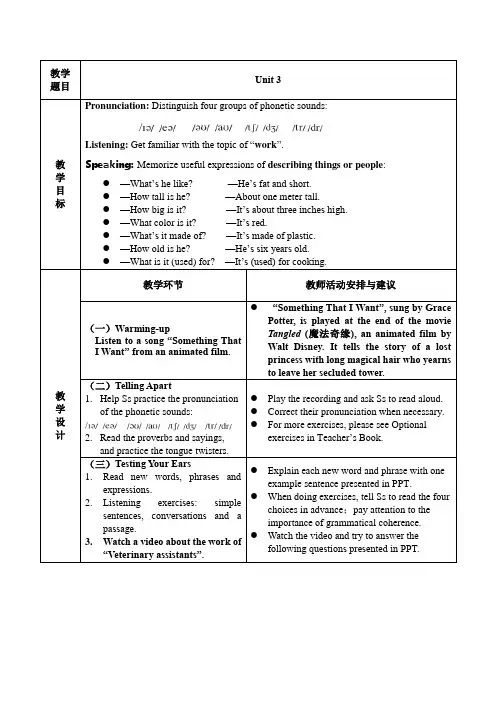
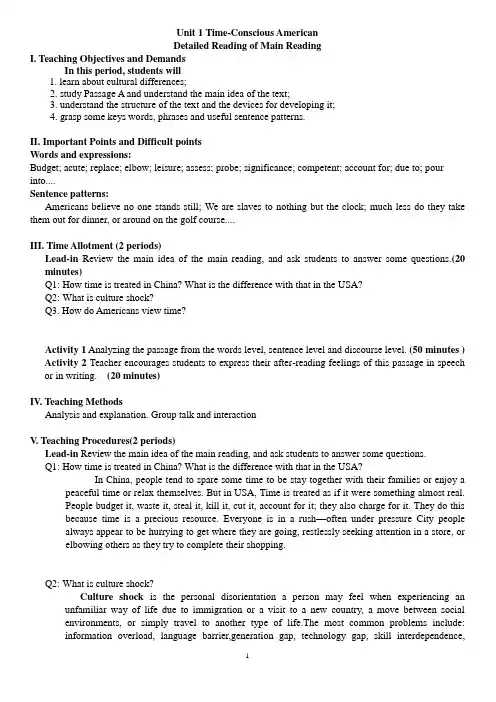
Unit 1 Time-Conscious AmericanDetailed Reading of Main ReadingI. Teaching Objectives and DemandsIn this period, students will1. learn about cultural differences;2. study Passage A and understand the main idea of the text;3. understand the structure of the text and the devices for developing it;4. grasp some keys words, phrases and useful sentence patterns.II. Important Points and Difficult pointsWords and expressions:Budget; acute; replace; elbow; leisure; assess; probe; significance; competent; account for; due to; pour into....Sentence patterns:Americans believe no one stands still; We are slaves to nothing but the clock; much less do they take them out for dinner, or around on the golf course....III. Time Allotment (2 periods)Lead-in Review the main idea of the main reading, and ask students to answer some questions.(20 minutes)Q1: How time is treated in China? What is the difference with that in the USA?Q2: What is culture shock?Q3. How do Americans view time?Activity 1 Analyzing the passage from the words level, sentence level and discourse level. (50 minutes ) Activity 2 Teacher encourages students to express their after-reading feelings of this passage in speech or in writing. (20 minutes)IV. Teaching MethodsAnalysis and explanation. Group talk and interactionV. Teaching Procedures(2 periods)Lead-in Review the main idea of the main reading, and ask students to answer some questions.Q1: How time is treated in China? What is the difference with that in the USA?In China, people tend to spare some time to be stay together with their families or enjoy a peaceful time or relax themselves. But in USA, Time is treated as if it were something almost real.People budget it, waste it, steal it, kill it, cut it, account for it; they also charge for it. They do this because time is a precious resource. Everyone is in a rush—often under pressure City people always appear to be hurrying to get where they are going, restlessly seeking attention in a store, or elbowing others as they try to complete their shopping.Q2: What is culture shock?Culture shock is the personal disorientation a person may feel when experiencing an unfamiliar way of life due to immigration or a visit to a new country, a move between social environments, or simply travel to another type of life.The most common problems include: information overload, language barrier,generation gap, technology gap, skill interdependence,formulation dependency, homesickness (cultural), infinite regress (homesickness), boredom (job dependency), response ability (cultural skill set). There is no true way to entirely prevent culture shock, as individuals in any society are personally affected by cultural contrasts differently.Q3. How do Americans view time?Time is treated by Americans as if it were something almost real. People budget it, waste it, steal it, kill it, cut it, account for it; they also charge for it. They do this because time is a precious resource.Everyone is in a rush—often under pressure City people always appear to be hurrying to get where they are going, restlessly seeking attention in a store, or elbowing others as they try to complete their shopping.Activity 1 Analyzing the passage from the words level, sentense level and discourse level.Background informationCultural differences: Students and teachers need to be aware that the ethnocentric attitudes ofwriters are precisely the way cultural conflict is encouraged. Why is understanding a culturealways the others’ responsibility? Is it not possible that each culture could be made awa re ofdifferent conventions? Both sides must work at rising above cultural differences and be willing tocompromise… and, in both cases, most likely neither side has access to the cultural conventionsof the other so blaming is not the answer.Language Points:Paragraph 1:1. Americans believe no one stands still. (Para. 1)Meaning: Americans believe no one keeps motionless; everyone moves.Here "stand" means "keep or stay in a particular position or state". In this sense, "stand" is followed by adjectives. More examples:The room stands idle. 这房间闲置着。
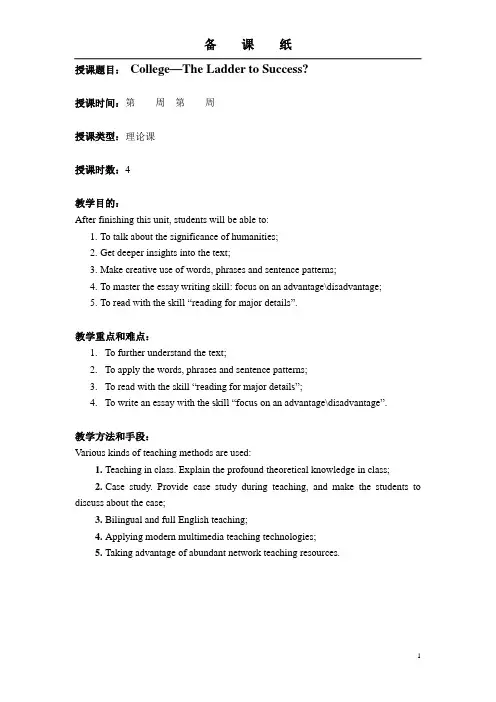
授课题目:College—The Ladder to Success?授课时间:第____周第____周授课类型:理论课授课时数:4教学目的:After finishing this unit, students will be able to:1.To talk about the significance of humanities;2.Get deeper insights into the text;3.Make creative use of words, phrases and sentence patterns;4.To master the essay writing skill: focus on an advantage\disadvantage;5.To read with the skill “reading for major details”.教学重点和难点:1.To further understand the text;2.To apply the words, phrases and sentence patterns;3.To read with the skill “reading for major details”;4.To write an essay with the skill “focus on an advantage\disadvantage”.教学方法和手段:Various kinds of teaching methods are used:1.Teaching in class. Explain the profound theoretical knowledge in class;2.Case study. Provide case study during teaching, and make the students to discuss about the case;3.Bilingual and full English teaching;4.Applying modern multimedia teaching technologies;5.Taking advantage of abundant network teaching resources.教学内容和过程:Section A The humanities: Out of date?Step One Warming-up Activities 30 minutesI.Lead-in:Discuss the following questions:1.How do you think of your current major? If you were given a second chance to choose your major, what would you select and why?—If I were given a second chance to choose my major, I would choose …/ I think being a … is …— accounting, computer science, psychology,—civil engineering, philosophy, medical technology …—popular, interesting, enjoyable, promising, practical, meaningful, beneficial, well-paid …2. What liberal arts / humanities courses do you learn in college? Do you think they are necessary for your education?— I learn Chinese, English, philosophy, psychology, history … in college. I think they are an essential part of the college education and benefit me a lot.• gain more insight in life and society• better understand and predict human behavior• realize different interpretations of life and history• understand the past which has created the present• be aware of cultural and religious differencesII.Cultural background1. What are the humanities?The humanities are a group of academic disciplines that study the human condition, using methods that are primarily analytical, critical, or speculative. Therefore, they are distinguished from the approaches of natural sciences. The humanities, called social sciences, include history, anthropology, communication studies, cultural studies, law, linguistics, etc.2. Why are the humanities important?Through exploration of the humanities, students learn how to think creativelyand critically, to reason, and to ask questions. Because these skills allow students to gain new insights into everything from poetry and paintings to business models and politics, humanistic subjects have been at the heart of a liberal arts education. Today, humanistic knowledge continues to provide the ideal foundation for exploring and understanding the human experience.Step Two Text Study 80 minutesI.Interactive reading of the text1. Reading comprehension1)Why do many students calculate they can’t major in English or history?2)Why does the author say that a college education is more and more seen as ameans for economic betterment rather than a means for human betterment?3)How do you understand “These days, labs are more vivid and compellingthan libraries” (Para. 3)?4)Why does the author say that the inner aspect of our being has captured ourimagination from the very beginning?5)According to the author, what are the advantages of studying the humanities?6)What are “well-rounded human beings” (Para. 10) according to the author?2. Structure of the textPart 1 (Para, 1-5) IntroductionTo improve their future chances of finding a job, college students are now moving away from the humanities and taking accounting or some “hard-skill” courses. The humanities will continue to be in bad shape due to the economic downturn. Nevertheless, the humanities can bring true value to people’s lives, and the basis of study of the humanities is formed by the inner power that has driven human beings to either greatness or destruction.Part 2 (Para. 6-9) Body: Why the humanities?This part presents the author’s argument to stand up for the true value that the humanities bring to people’s lives.Part 3 (Para 10) Concluding partThe humanities help to create human beings with insight and understanding of the passions, hopes and dreams common to all humanity. The humanities will never be out of date. They are as useful and relevant in our modern age as they have alwaysbeen.3. Summary of the TextRetell the text according to the following tips.1)(Part I) When the job market worsens, many students calculate ... Probably, the humanities will continue …. Once …, the humanities now …2)(Part II) Here, please allow me to … that the humanities add to people’s lives. Studying the humanities improves… Most importantly, studying the humanities invests us with …, thereby… Perhaps the best argument in favor of the humanities is… In fact, increasingly… is seen as the ideal in…3)(Part III) In summary, the humanities help to create …, teach us to … and… It makes sense to …, our outstanding and remarkable …nguage FocusWords and expressions1. when the going gets tough: when the situation becomes difficultWhen the going gets tough, women can get as tough as men.当形势变得严峻时,女人可以变得跟男人一样坚强。
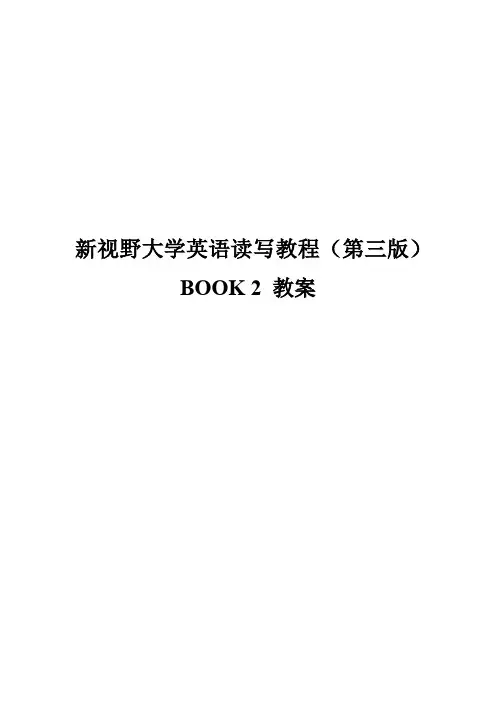
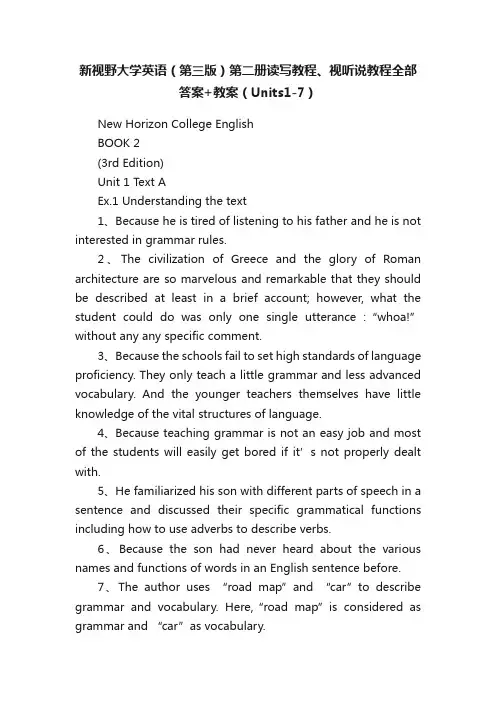
新视野大学英语(第三版)第二册读写教程、视听说教程全部答案+教案(Units1-7)New Horizon College EnglishBOOK 2(3rd Edition)Unit 1 Text AEx.1 Understanding the text1、Because he is tired of listening to his father and he is not interested in grammar rules.2、The civilization of Greece and the glory of Roman architecture are so marvelous and remarkable that they should be described at least in a brief account; however, what the student could do was only one single ut terance :“whoa!” without any any specific comment.3、Because the schools fail to set high standards of language proficiency. They only teach a little grammar and less advanced vocabulary. And the younger teachers themselves have little knowledge of the vital structures of language.4、Because teaching grammar is not an easy job and most of the students will easily get bored if it’s not properly dealt with.5、He familiarized his son with different parts of speech in a sentence and discussed their specific grammatical functions including how to use adverbs to describe verbs.6、Because the son had never heard about the various names and functions of words in an English sentence before.7、The author uses “road map”and “car”to describe grammar and vocabulary. Here,“road map”is considered as grammar and “car”as vocabulary.8、Since the subjunctive mood his son used is a fairly advanced grammar structure, the interjection“whoa!”reflects the tremendous pride the father had toward his son; it also reflects the author’s humor in using the word because it was once used by his student, though in two different situations and with two different feelings.Ex.3 Words in use1.condense2.exceed3.deficit4.exposure5.asset6.adequate/doc/694713736.html,petent8.adjusting9.precisely 10.beneficialEx.4 Word building-al/-ial:managerial/editorial/substance/survival/tradition/margin -cy : consistency/accuracy/efficient-y : recovery/ministry/assemblyEx.5 Word building1.editorial2.recovery3.accuracy4.substance5.managerial6.margin7.assembly8.Ministry9.survival 10.tradition 11.consistency 12.efficientEx.6 Banked cloze1-5: L C J A I 6-10: O N E H FEx.7 Expressions in use1.feel obliged to2.be serious about3.run into4.distinguish between5.thrust upon6.was allergic to7.get lost8.be attracted to9.make sense 10.looked upon asEx.8 Structured writingSome bookworms in my dormitory often spend hours reading their “Bible”, Practical English Grammar, and do a lot of exercises in that book , but I don’t ca re about it at all. My assumption is since I have never learned Chinese grammar, what’s the sense of learning English grammar? In fact, English grammar has always been a big headache to me.English grammar is very complicated because, unlike Chinese, there are many verb tenses. Even stranger than verb tenses, English grammar also contains something very confusing. For example, I don’t remember how many times my middle school teacher tried to“impose”the differences between used to and be used to on us. Sometimes he would go on with the explanation for 20 minutes or so. He even summarized the differences by listing three or four points for us to memorize. However, they could never stay in my head . I don’t remember how many times I got it wrong with the sentences containingused to or be used to on my exams . I was really confused with these two phrases,and I can never get them right.In brief, I’m allergic to learning English grammar. Curiously, I just wonder if the native speakers of English have a microcomputer in their brain to help them utter the two phrases promptly with just a click of their brain mouse!Ex.9 E-C Translation人们普遍认为英语是一种世界语言,经常被许多不以英语为第一语言的国家使用。
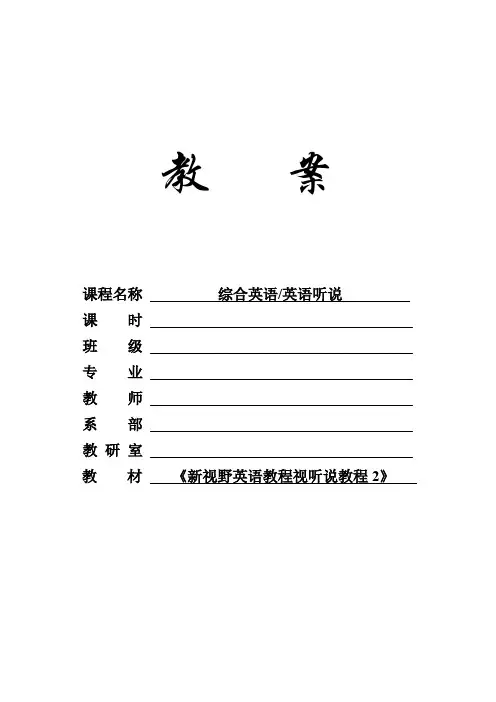
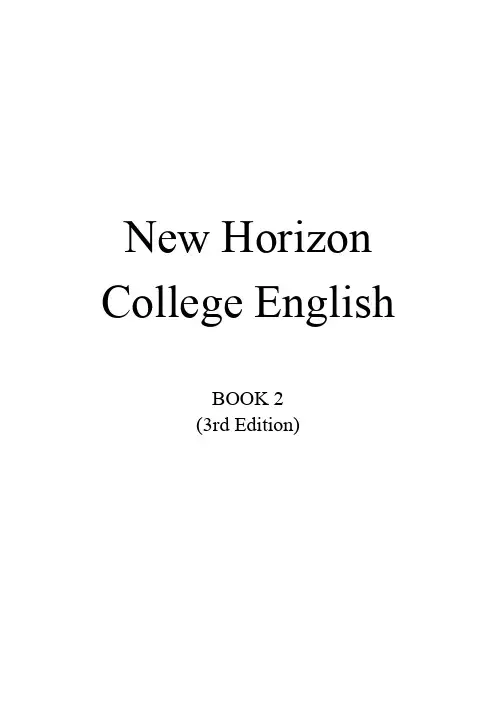
New Horizon College EnglishBOOK 2(3rd Edition)Unit 1 An Impressive English Lesson课型:□ 理论课√ 理论、实践课□ 实践课课时分配:6教学环境:多媒体教室教学目标:After studying this unit, the students are expected to be able to:1. understand the main idea and structure of Section A and Section B;2. master the key language points and grammatical structures in the texts3. talk about language teaching and learning and express their opinions about current way of teaching in an English class;4. read with the skill ―finding key ideas in sentences;5. write a composition with three main parts: introduction, body and conclusion.Key Issues:1. VocabularyTedious, absorbed, allergic, capture, condense, exceed, distinguish, distinctive, complimentary, complementary, proclaim, evidently, adequate, competent, adjust, beneficial2. SkillsLearn to read with the skill ―finding key ideas in sentences and write a composition with three main parts: introduction, body and conclusion.Potential Problems and Difficulties●To talk about language teaching and learning●write a composition with three main parts: introduction, body and conclusion.●To apply the phrases and patternsMethodology:A combination of traditional teaching methods with the communicative approach will be adopted. Special attention should be paid to classroom interaction like questioning and answers. Small group works are always needed while discussing the questions and the difficult translation practice. More encouragement is needed and more guidance will be given in their extracurricular study.Teaching Aids: Visual aids, projector, stereo and microphoneGroup work and pair workConduct of Tasks and Activities(师生互动方式Mode of Interaction; 学习策略Learning Strategies)Students-centered, Task-based teaching and learningTeaching ProceduresStep 1 Lead-inI. Greeting and warming-up questions discussion.1. What are the key factors that help people learn English as a foreign language?2. Do you have any problem in English learning?3. Do you think grammar is important in English learning?II. Listening and discussing.1. Listening practice.2. In your opinion, what is the most effective way to learn English?III. Listening to a talk and answer questions on page 2Step 2 Section A An Impressive English LessonI. Cultural background American university education1.What is Communicative Language Teaching?A type of teaching method;Develop the communicative ability as well as the knowledge of grammar; Learning by doing;Make classroom situation of real foreign language environment.2. What are the features of Communicative Language Teaching?Communicative competence is the goal;An integration of grammatical and functional teaching;Accuracy is secondary to conveying a message;Focus on communicative and contextual factors in language use;Learner-centered and experience-based.3. What is the role of teacher in Communicative Language Teaching?A facilitator of students’ learning;A manager of classroom activities;An advisor of students’ questions;A co-communicator in the communicative activity.II. Language PointsWords and expressions1. oddity: n. [C] a strange or unusual person or thing 怪人;怪物;奇特的东西With his neat suits on, he felt like an oddity walking in this poor neighborhood. 穿着笔挺的西装走在这个贫民区里,他觉得自己就像个怪物。
新视野大学英语视听说教程(第三版)第二册第一单元教案备课纸授课题目:Unit 1授课时间:第____周第____周授课类型:实训课授课时数:4 教学目的及要求:By learning this unit, the student should 1) be able to talk about learning experiences. 2) listen for signal words for listing. 3) give and respond to advice.4) talk about learning / teaching methods.教学重点及难点:1. Listening skill: listen for signal words for listing.2. Speaking skill: give and respond to advice.教学方法和手段:Task-based communicative, multi-modal teaching through: 1. Recording listening; 2. Video watching; 3. PPT showing;4. Individual work, pair work We gain second-hand experience by reading books. A little knowledge is a dangerous thing.1Life is a learning curve备课纸— Albert EinsteinYes. It is dangerous for a person who knows a little about something thinks he knows it all.The best way to learn is to teach. — AnonymousYes. Going through the process of trying to explain something to others will help you understand, absorb and consolidate what you have learned.Step Two Listening to the world I. Sharing1. Watch a podcast for its general idea.2. Watch Part 1 and fill in the blanks.3. Watch Part 2 and check the true statements.4. Watch Part 3 and fill in the blanks.5. Work in pairs and discuss the question. II. Listening1. Introduce the listening Skill: Listening for signal words for listing Listen for the total number of items at the beginningListen for words and expressions that signal the beginning, following and end of the listinge.g. the last, the final, lastly, and finally Listing items with equal valuee.g. to begin with, to start with, furthermore, moreover, inaddition, besides, what’s more, the last but not the least, lastly, finally Words and expressions indicating importanceexpressions: above all, the most important / obvious / noteworthy Adjectives: main, vital, significant, chief, central, principal, primary, major, distinctive, and the –est forms of adjectives Listen to Part 2 of the radio program. Then match the people to the film stars they like.2. Listen to a radio program and rearrange the following expressions.3. Listen to the radio program again and complete the table.4. Fill in the blanks.III. Viewing1. Read the program information below and check the true statements.2. Read the statements. Then watch the video clip and underline the correct alternative.3. Read the statements and the answer choices. Then watch the video clip again and choose the best answers.2备课纸Step Three Speaking for communication1. Read the statements. Then listen to a conversation and check the true statements.2. Read the table. Then listen to the conversationand write G for giving advice and R for responding to advice in the right column.Speaking Skill: Giving and responding to adviceGiving and responding to advice in an appropriate way are useful and important speaking skills.Expressions for giving advice Why don’t you…?My( main/personal) recommendation/suggestion/ is/would be…If that happened to me/ If I were in your place/ if I were you/ In that case, I’d recommend…Do you think it is a good idea…? The sooner you…the better.…might work/ would probably work/is worth a try.If you ask me/ The way I see it, it probably would have been better(not) to have… Expressions for responding to advice ? Thank you, I’ll take that into consideration. ? Thanks. That sounds good/interesting.I hadn’t thought of that before. Thank you so much for offering that advice. Thank you for the advice. I’ll try… Maybe you’re right. Thanks for saying that.3. Look at the pictures and read the conversations below. Then fill in the blanks using the words in brackets.4. Role-play the situations.Step Four Further practice in listening I. Short Conversations1 Q: What can we learn from the conversation?B The woman should seek help from the writing center. 2 Q: Why does the woman choose to learn French?D She thinks speaking French is a must for cultured people.3 Q: What did the man do last night? D He attended a speech.4 Q: What made Melissa unhappy?C That she lost her chance to enter the contest. 5 Q: What does the man think of the woman’s opinion? A It is one-sided. II. Long Conversation1 Q: How is the woman doing in the man’s class?C She often fails to turn in her homework on time. 2 Q: What does the woman think of learning Spanish?3备课纸D It presents difficulty for her.3 Q: What do we know from this conversation about the man?A He has a good personal relationship with the woman.4 Q: What is the woman most likely to do after talking with the man?C Work harder in her Spanish class. III. Passages 1. Passage one1 Q: What do you know about the speaker’s Spanish learning experience in high school?D She showed dissatisfaction with the slow pace of her class.2 Q: What made the speaker feel more frustrated while learning Spanish in high school?A She had to learn the material that she already knew.3 Q: What did the speaker say about her study of Spanish literature in college? C It proved to be an unbalanced way to learn the language.4 Q: Which experience benefited the speaker most in terms of her use of Spanish? D She taught Spanish speakers how to speak English. 2. Passage two 1) alternative 2) numerous 3) traditional 4) academic 5) countryside 6) athletes7) take advantage of 8) Secondary9) in a collective effort 10) serve as作业:Preview Section B。
基础教学部外语教研室大学英语(2)教案课题名称Unit One: Language in mission课次第(1-4)次课课时1.Every teaching period contains 45 mins2.Every 2 periods for each teaching stage3.4 stages (2 weeks) for Unit 1课型理论(√);实验();实习();、实务();习题课(√);讨论(√);其他()授课班级教学目标Teaching Objectives:1)To talk about language teaching2)To further understand the text3)To apply the phrases and patterns4)To master the essay writing skill重点、难点及解决方法Text analysis; language points and sentence patterns; writing skills本单元教学基本内容与时间分配Total class time for this unit: 8 periodsSuggested arrangement:1) Pre-reading activities of Text A: 20'2) Self reading conduction A for questions answers: 10'3) Structure analysis 10'4) Detailed discussion of solving problems: 505) Text summary:20'6) Language points summary: 307) Critical Thinking 20'8) Writing assignments: 20'9) Reading skill analysis: 30'10) Detailed study of Text B: 50'11) Comprehensive exercises of Section B: 10'12) Listening&speaking : 90'教学过程Text A第一次课教学目的及要求After completing this text, students should be able to:use the key language to talk about English learningapply the reading skill – reading for the key idea in a sentence write a three-part essay with a good introductiontranslate sentences by properly using conjunctionsuse English learning strategies consciously教学重难点Using proper language to talk about English learningHow to apply the reading skill – reading for the key idea in a sentence教学材料教学方法1. 教学材料:Text A课文、练习2. 教学方法:Under the guidance of student-centered principle, apply communicative andheuristic teaching methods, stimulate students’ interest in learning English and get students involved in class participation教学过程一、课前导入Talking about your experience of learning EnglishWatch the video clip and discuss the following question in pairs.1)According to the speaker, in what ways did Chinese students learn English?Chinese students practice their English by screaming it.2)Do you agree with what he said about Chinese students learning English? Why or why not.Yes, I just learned English exactly that way.No, we have learned English in different ways.3)How do you learn English? What do you think of your way of English learning?I learn English by:listening to the teacher carefully in classtaking notes …to go over lessons latercatching every chance to practice speakinglistening and reading a lotdoing enough exercises to practice grammar rulesI think my way of English learning is:effective, ineffective, interesting, boringchallenging but rewardingexamination-oriented二、文本学习1. Global understanding of the text1)Scan the text in three minutes and fill in the blanks.After I read the passage, I know the text talking about how _________ and __________ can betaught efficiently. The writer might be a ________ and a ________________ as well.2)What is the writing style of the text? Why?The writing style of the text is relaxed, which is proved by a lot of short sentences andparagraphs, casual verbs, daily talks and simple modifiers.3)Map the text structure and fill in the blanks.2. Detailed understanding of the textRead the text again and answer the following questions.1) Why does the son think that his father is a tedious oddity?Because he is tired of listening to his father and he is not interested in grammar rules.2) Why does the author think that students’ language deficits should be blamed on schools?Because the schools fail to set high standards of language proficiency. They only teach alittle grammar and less advanced vocabulary. And the younger teachers themselves have littleknowledge of the vital structures of language.3) What does the father teach the son while giving him a grammar lesson?He familiarized his son with different parts of speech in a sentence and discussed their specific grammatical functions including how to use adverbs to describe verbs.4) What are the two things that the author uses to describe grammar and vocabulary?The author uses “road map” and “car” to describe grammar and vocabulary. Here,is considered as grammar and “car” as vocabulary.5) How do you understand the interjection “whoa!” said by the father toward the end of the text?Since the subjunctive mood his son used is a fairly advanced grammar structure, the interjection “whoa!” reflects the tremendous pride the father had toward his son; it also reflects humor in using the word because it was once used by his student, though in twothe author’sdifferent situations and with two different feelings.第二次课一、文本拓展1) Text SummaryAn Impressive English LessonTo my son, I am a _____________: a father he is __________ listen to and a man____________ the rules of grammar. And I got ______________ this because my student wasunable to describe properly her feeling on her __________ to Europe.However, it doesn’t ________________ to criticize our students. They unfairly bear the bulk ofthe criticism for these __________________ because there is a sense that they_________________. On one hand, they are misled by the____________. On the other hand,school fails to _________________ the essential framework of language, accurate grammar andproper vocabulary. Perhaps, language should be looked upon as a _________ and a___________________: often study the road map (check grammar) and ________ the car engine(adjust vocabulary). Learning grammar and a good vocabulary is just like driving with a roadmap in a ________________ car. __________, _________, and __________ communication depends upon grammar and a good vocabulary, the two __________ assets for students, but theyare ________________ in schools.2) Language Points3. Criticl thinking1)What do you think of the “impressive English lesson”? Is it effective?Yes. Because the lesson aroused c hildren’s interest in learning English grammar.Yes. Because the way to learn grammar is more natural, interesting and enjoyable.Yes, because learners become more motivated when learning something they like.arning without formal instruction.No. because it’s like a street le2) Do you think English grammar helps you a lot in learning English? Why or why not?English grammar helps a lot:Order sentences correctly.Use words properly.Talk with other English speakers confidentlyEnglish grammar is of little help:Only give rules that are hard to remember.It is not helpful in a real-life setting due to the limited time to think and recall the rules.Not always applicable to the real language, especially idioms.3) How can you effectively enlarge your vocabulary?Read more English from online sources.Watch English TV / listen to English radio / watch English online videos.Talk often with English speakers.Listen carefully and extensively.Use dictionaries to look up unfamiliar words.Use new words as often as possible.二、写作训练 (P13)1)Structure AnalysisAs the name of our textbook implies, we read English in order to write in it. But how towrite in the English way?As is known to all of us, what we write reflects what we think; andhow we write mirrors how we think. In that light, our best way of writing in English is to knowwell how to think in English as the American or British people do. What is their way ofthinking then?Different from us who think in the spiral way (螺旋式), they tend to think in the linear way (线性方式). As far as paragraph writing is concerned, deduction (演绎法) is typical of their linear way of thinking, as shown below:Starting from this book, you are moving from paragraph writing to short essay writing. In a likely manner, however, we will go through the same process for essay writing as we did for paragraph writing. In college writing, an essay normally has three main parts: introduction, body,and conclusion.The introduction is usually one short paragraph that introduces the topic to be discussedand the thesis or thesis-advancing statement which is often placed at the end of the introductory paragraph.The thesis statement can be an opinion, an attitude or a stand about the topic. An introductory paragraph should be inviting to make the reader want to continue reading. A goodintroduction may start with an anecdote, a short story, an interesting personal account, athought-provoking question, a famous quotation or a general statement. Read the example now.2)Writing practiceDirections: Write an essay of no less than 150 words on one of the following topics. Onetopic has an outline you can follow.Topic: Grammar, a headache to meIntroduction: Thesis statement: English Grammar is a big headache to me.Body: Example: The difference between used to and be used toConclusion: I’m allergic to learning English grammar.More topics:? Learning English through imitation / repetition? Learning English with / without grammarText B第三次课教学目的及要求To be at home with previewing skillsTo decode Text B through reading for the key ideasTo derive knowledge from Text BTo learn how to write better in English教学重难点How to derive knowledge from Text B教学材料教学方法1. 教学材料:Text B课文、练习2. 教学方法:Under the guidance of student-centered principle, apply communicative andheuristic teaching methods, stimulate students’ interest in learning English and get students involved in class participation教学过程1. 阅读指导Reading Skill – Reading for the Key Ideas in Sentences1) Why are students encouraged to read for the key ideas in sentences?Looking for the key idea in a sentence, especially for a complex sentence, is of crucial importance to comprehension of the whole passage. And, finding the key ideas of a sentenceis also of great importance since we always read for information. While a sentence may givea great deal of information, it usually offers one key idea. Students must be able to find thekey ideas in order to understand sentence meanings clearly.2) What can the skil l “reading for the key ideas in sentences” do for us?It does render students’ ability in reading:It can help readers understand the meaning of a sentence clearly;It can help students separate minor details from the main idea.It can help readers quickly grasp the main idea of the whole paragrapheven to the text while doing skipping reading.3) What to keep in mind to find out the key idea of a sentence?Who or what the sentence is about.What action is taking place.(What is the person or object doing?What is being done to the person or object?)What are minor details and what are the main ideas. (Many words in a sentence describethings about the subject of the sentence but they merely find the details to it. If we askwhen, what, where, or why, we will find out these details, which further help us to see thekey idea of the sentence.)4) What to keep in mind to find out the key idea of a sentence?Of course, we cannot always easily decide which details are simply descriptive and which add much to the key idea. However, the starting point for determining the key idea ina sentence is to find who or what the sentence is about and what the person or object isdoing.2. 文本学习1) Applying the reading skillLearning” tell us?What can the title “The Great Journey ofThe title “The Great Journey of Learning”, coupled with the topic “Language in M the unit, tells us the central idea—The process of learning has a profound effect on one’s lif 2) Detailed understanding of the textRead Text B and choose the best answer to each of the questions (Page 24)Read the text again and think about the following questions:1. Why did Malcolm X want to learn English? (Para.2)Because he was poorly educated, he felt inadequate to teach his new beliefs to others.2. What motivated Malcolm X to launch on a quest to overcome his language deficiencies?Malcolm X’s considerable frustration at his inability to read and write launched him on a questto overcome his deficiencies.3. How did Malcolm X move from basic literacy toward true proficiency? (Para. 5)He copied dictionary, read everything he had written aloud and logged important things thathappened every day. Repetition helped move him from basic literacy toward true proficiency.4. What did Malcolm X obtain from language learning? (Paras. 9-10)Reading had changed forever the course of Malcolm X’s life. As he acquired knowledge, his horizons expanded. He had left behind the narrow, ignorant world of his youth to join the worldcommunity of thoughts and actions ever since he started with his great journey of learningEnglish in prison.3. 知识总结听说训练第四次课教学目的及要求Talk about learning experiencesListen for signal words for listingGive and respond to adviceTalk about learning / teaching methods教学过程1. Listening to the worldSharing1) Watch a podcast for its general idea.The podcast is mainly about the things people are learning at the moment and the most difficult thing they have ever learned.2) Watch Part 1 and fill in the blanksnew thingsAt the momentquite difficult3) Watch Part 2 and check the true statements.ListeningListening skillsListening for signal words for listingListen for the total number of items at the beginningListen for words and expressions that signal the beginning, following and end of the listinge.g. the last, the final, lastly, and finallyListing items with equal valuee.g. to begin with, to start with, furthermore, moreover, in addition, besides, whatmore, the last but not the least, lastly, finallyWords and expressions indicating importanceexpressions: above all, the most important / obvious / noteworthyAdjectives: main, vital, significant, chief, central, principal, primary, major,distinctive, and the –est forms of adjectives1)Listen to a radio program and rearrange the following expressions.e-c-a-g-d-h-b-f2) Listen to the radio program again and complete the table.speaksaying the wrong thingpractice speaking / talking to himselfmaking mistakesnative speakerspronunciationlistening skillslistening and readingViewing1) Read the statements. Then watch the video clip and underline the correct alternative.1 The results of the 1932 test were2 the same as they were in 19323 the exam they have done4 well2) Read the statements and the answer choices. Then watch the video clip again and choosethe best answers.1 D2 A3 B4 A5 D2. Self-studyPassage 1&2教学方法总结explanation; discussion; exemplification教学手段CAI(计算机辅助教学)等;课外学习安排布置作业、讨论题、思考题、预习参考资料New H orizon College English: Teachers’ Book New Horizon College English: Integrated ExercisesOn-line resources: English on line学习效果评测单元测试,课外学习指导安排邮件、网络指导教学后记Through the study of this unit, the students have a clear understanding about how to learn English in a new environment. Besides, the reading and writing skills very practical and helpful.备注。
新视野英语教程读写教程第二册电子教案学科英语教材《新视野英语教程2》课题Unit 1 班级课时 6 periods 时间课型New class教法讲授法练习法教具多媒体电脑投影仪教学目标1、掌握本单元教学中规定的单词和词组。
2、掌握there is (no) room for..., even so等句子结构的用法。
3、掌握应用文:Understanding and Writing Invitation Letters 写作技巧。
4、掌握本单元教学中规定的听力能力及口语交际能力。
教学重点1、重点:New words and Expressions2、难点:Listening and Speaking教学过程主要教学内容Part One Section AI. New Words and Expressions1. tear down: v.pull down, especially violently; destroyWe have a theatre in town but we are to tear it down next year tomake room for the highway.2. golden: a.(1) of the color of goldDo you refer to the one that has a golden yellow flower, a browncenter and a strong stem?(2) made of goldThe medal was g olden, so it was sold for quite a lot of money.3. danger: n.the possibility of harm or lossA policeman could meet with danger any minute of his workingday.in danger of: likely to be hurt or damaged byThe trees in the forest have been cut down in such great numbersthat the forest is i n danger of d isappearing.4. line of thinking /thought: a way or method of thinking aboutsomethingI worry about this line of thinking because it is not good forchildren.5. resident:n.a person who lives in a placeThis hotel serves meals to residents o nly.a. Living in a placeIn 1970 about one fifth of resident college and university students were women.6. inspect: vt. examine closely or in detail, especially in order to judgequality or correctness; make an official visit to judge the qualityYesterday a man from the local education committee came to inspect o ur school.7. inspector: n.an official who inspect somethingThe tax inspector has a complete right to examine the company files.8. structure:n.(1) something formed of many parts, especially a building,The steel structure looks very strange among the small wooden houses.(2)the way in which parts are formed into a whole,Scientists now know quite a lot about the structure of the human brain.vt. Arrange into a whole form, in which each part is related to others It is difficult for me to understand why things are structure in sucha way in their family.9. claim:v.(1) declare to be true, stateOne should not claim to know what one doesn’t know.(2) ask for, take, or state that one should have something to whichone has a rightOn what grounds are you claiming compensation? You have to state reasons.n.(1)a statement that something that is true or realLots of people say that never read advertisements, but this claim is hard to believe.(2) a demand or request for something which one has a right to have,The workers have come out on strike in support of their pay claim.10. register:n.an official record or listAll stores which sell guns must keep a register showing the details of each deal.v.put into an official record or list,registered.They made sure that each book was numbered andII. Sentence Structure1. They are using the earthquake as an excuse.Meaning: The reason that the building was damaged in an earthquakewas not a real one: McDonald’s managers are using it to hide the realreason for tearing down the building.2. There is no room for a drive-thru window, or for seating inside.Meaning: There is no space where people can buy food without gettingout of their car. Nor is there space for people to sit and eat inside.3. The building is still there, but boards cover the windows. Even so;people drive by to remember their McDonald’s.Meaning: Although the windows of the restaurant are covered withboards, people still stop by to visit their McDonald’s when driving past i 4. Taking pictures of a moment in history the restaurant is gone.Meaning: They take pictures to record a time in history before therestaurant is gone.III. Questions About the Text1. Where and when was the first McDonald’s built?2. Why does McDonald’s want to tear down the restaurant?3. Why do some people want to save the first McDonald’s?4. What is McDonald’s real purpose to tear down the restaurant?5. What is the author’s purpose of writing this article?Part Three Section CPractical Writing:Understanding and Writing Invitation LettersPart Four Listening and Speaking1. What do you think about...?2. How do you like...?3. I like /love it. /I hate it.4. It’s great. /it’s horrible.Part Five Summary1. New Expressions2. Sentence Structure3. Practical Writing4. Listening and SpeakingPart Six HomeworkP9, 10, 11, 12, 17, 18, 20, 21.四、教学总结:1.本课A部分是关于麦当劳的文章,学生会比较感兴趣,由此可以多介绍英美国家的饮食,特别是快餐的情况。
教 案案New Horizon College English 新视野大学英语读写教程(一)教研室: 教师姓名: 课程名称课程名称授课专业和班级 授课内容 Unit 7 Women Women at at the Management Level授课学时 6 教学目的 The teaching objective of this unit is to help students:grasp the main idea and structure of the text;2. To understand the structure of 2. To understand the structure of ““A general statement supported by example[s]example[s]”;”;3. To write 3. To write ““A general statement supported by example[s]A general statement supported by example[s]”” essays;4. To master the key language points and grammatical structures in the text.5. To conduct a series of reading, listening, speaking and writing activities related to the theme of the text.教学重点 1. Text structure analysis2. Language points:Key words and expressions: administrative,?attorney,?accommodation,?segment,?be disposed?to?do?sth., on?both?counts, feel?at?ease?with?sb, make?a?concession / concessions?to, come?down?to,?take?exception?to?sth.,?burst?into,3. Writing skills: a general statement supported by example[s] 教学方法 1. Communicative approaches;2. Task-based teaching method;3. Audio-lingual method.教学过程 1. Warm-up Activities2. Text Structure Analysis3. Detailed Study of the Text4. Grammar and exercises5. Writing and reading skills practice作业 Homework:1. Recite the appointed paragraph.2. Translate sentences and write a paragraph showing “a generalstatement supported by example[s]statement supported by example[s]””.辅助手段 Multimedia software 辅导答疑教学内容Ⅰ. Warm-up activities Step 1 GreetingsGreet the whole class as usual.Step 2. Review1. Ask students some questions to review the last lesson (show them on the screen screen)).2. Check the homeworkMethod: Talk in groups; Use task-based language teaching method, communicative approach, and audio-lingual method.Step 3. Lead-in and preparation for readingShow the Ss some pictures and let them talk to each other about the topic on the screen.1. What is career woman?2. Should women stay home or work outside? Why?3. What are the advantages and disadvantages for the career woman?Purpose: Arouse the students’ interest of study. Bring in new subject: Genetic EngineeringStep 4. Fast readingAsk the Ss to read the passage as quickly as they can and to answer the questions on thescreen. Let them get the main idea of each paragraph and make clear about the text structure. Ⅱ. Text Structure AnalysisPurpose : : Improve the students’ reading and writing ability and understand the Improve the students’ reading and writing ability and understand the general idea of each paragraph.Method : Read the text individually and talk in groups; Use task-based language teaching method, reading approach, communicative approach and total physical response methodPart I (paras. 1-2): Introduction (thesis statement) of the textPart II (paras. 3): How female bosses managePart III (paras. 4-5): How male and female bosses are different in working styles Part IV(paras. 6-8)?: Why male and female bosses manage differentlyPart V(paras. 9): Obstacles for female bossesPart VI(paras. 10): ConclusionⅢ. Detailed Studies of the TextWords and Phrases1. employeen.[C] sb. who is paid to work for sb. else 受雇者;雇员Knowing what an employer is looking for in a potential employee can help someone to prepare for an interview.了解雇主在寻找什么样的潜在雇员可以帮助人们准备面试。
授课题目: College—The Ladder to Success?授课时间:第____周第____周授课类型:理论课授课时数:4教学目的:After finishing this unit, students will be able to:1. To talk about the significance of humanities;2. Get deeper insights into the text;3. Make creative use of words, phrases and sentence patterns;4. To master the essay writing skill: focus on an advantage\disadvantage;5. To readwith the skill “read ing for major details”.教学重点和难点:1. To further understand the text;“readin2. To apply the words, phrases and sentence patterns;3. To read with the skillg for major details”;4. To write an essay with the skill “focus disadvantage”.教学方法和手段:Various kinds of teaching methods are used:1. Teaching in class. Explain the profound theoretical knowledge in class;2. Case stud y. Provide case study during teaching, and make the students to discuss about the case3. Bilingual and full English teaching;4. Applying modern multimedia teaching technologies;5. Taking advantage of abund ant network teaching resources.教学内容和过程:Step One Warming-up Activities 30 minutesI. Lead-in:Discuss the following questions:1.How do you think of your current major? If you were given a second chance to choo se your major, what would you select and why?— If I were given a second chance to choose my major, I would choose …/ I think bei ng a … is …— accounting, computer science, psychology, — civil engineering, philosophy, medi cal technology …— popular, interesting, enjoyable, promising, practical, meaningful, beneficial, well-p aid …2. What liberal arts / humanities courses do you learn in college? Do you think they are necessary for your education?— I learn Chinese, English, philosophy, psychology, history … in college. I think they? gain more insigh are an essential part of the college education and benefit me a lot.t in life and society ? better understand and predict human behavior ? realize different interpretations of life and history ? understand the past which has created the prese nt ? be aware of cultural and religious differencesII. Cultural background 1. What are the humanities?The humanities are a group of academic disciplines that study the human conditi on, using methods that are primarily analytical, critical, or speculative. Therefore, the y are distinguished from the approaches of natural sciences. The humanities, called so cial sciences, include history, anthropology, communication studies, cultural studies, l aw, linguistics, etc.2. Why are the humanities important?Through exploration of the humanities, students learn how to think creativelyand critically, to reason, and to ask questions. Because these skills allow students to gainnew insights into everything from poetry and paintings to business models and politic s, humanistic subjects have been at the heart of a liberal arts education. Today, humani stic knowledge continues to provide the ideal foundation for exploring and understand ing the human experience.Step Two Text Study 80 minutesI. Interactive reading of the text1. Reading comprehensionmajor in English or history?1) Why do many students calculate they can’t2) Why does the author say that a college education is more and more seen as a means for economic betterment rather than a means for human betterment?3) How do you understand “These days, labs are more vivid and compelling(Para. 3)?than libraries”4) Why does the author say that the inner aspect of our being has captured our imagination from the very beginning?5) According to the author, what are the advantages of studying the humanities? 6) W(Para. 10) according to the author?hat are “well-rounded human b eings”2. Structure of the textPart 1 (Para, 1-5) IntroductionTo improve their future chances of finding a job, college students are now moving awcourses. The huma ay from the humanities and taking accounting or some “hard-skill”nities will continue to be in bad shape due to the economic downturn. Nevertheless, thlives, and the basis of study of the humae humanities can bring true value to peopl e’snities is formed by the inner power that has driven human beings to either greatness or destruction.Part 2 (Para. 6-9) Body: Why the humanities?argument to stand up for the true value that the humanit This part presents the author’slives. Part 3 (Para 10) Concluding parties bring to people’sThe humanities help to create human beings with insight and understanding of the pas sions, hopes and dreams common to all humanity. The humanities will never be out of date. They are as useful and relevant in our modern age as they have alwaysbeen.3. Summary of the TextRetell the text according to the following tips.1(Part I) When the job market worsens, many students calculate ... Probably, the huma nities will continue …. Once …, the humanities now …2(Part II) Here, please allow me to … that the humanities add to people’slives. Studying the humanities i mproves… Most importantly, studying the humanities invests us w ith …,thereby… Perhaps the best argument in favor of the humanities is… In fact, in creasingly…is seen as the ideal in…3(Part III) In summary, the humanities help to create …, teach us to …and… It makes sense to …, our outstanding and remarkable …II. Language Focus Words and expressions1. when the going gets tough: when the situation becomes difficult当形势变得严峻时,女When the going gets tough, women can get as tough as men.人可以变得跟男人一样坚强。
Unit 9( by He Y uanyuan )Objectives:1. to help the students grasp the main idea and the text structure2. to help the students master the vocabulary and sentence structures3. to conduct a series of exercises related to the texts4. to help the students understand and write noticesOutline:The teacher will use 6 classes to finish the unit. The first two classes will be mainly used to finish Section A. The following two classes will be mainly used to finish the exercises related to Text A, Basic Writing Skills and Section C. The last two classes will be mainly used to finish Section B. Focuses & Difficulties:1. master the vocabulary and sentence structures in the texts2. write noticesPart I: (2 classes) Discussion of Text AActivity 1: (10 mins)Warm-up: Leading in and Exploring the Topi c — Improvement in AppliancesStep 1 :(2 mins) Leading in: Introduction to the TopicStep 2 :(8 mins)ExploringThe teacher (T) may ask the students (Ss) to work in pairs on the two questions in this part to check their opinions on the “smart” appliances.Activity 2: (80 mins)Understanding and Learning Text AStep 1: ( 15 mins) Reading ThroughThe T asks the Ss to read through Text A and try to finish the exercises on page 166. ( 10 mins) Then the T checks the answers together, and offers some brief explanation wherever necessary. ( 5 mins)Step 2 : (5 mins)Go over the New Words and Phrases by leading the Ss to read aloud them and ask the Ss to learn them by heart.Step 3: ( 55 mins) Detailed Study of Text A1.be toast: be or be likely to become finished, or deade.g. We are toast in the match because he can’t play today.2.appliance: ne.g. More and more housework can be done with the help of appliances.3.… to drive customers up the wall.: …to to make customers angry or even mad.drive sb. up the wall: drive sb. into a state of great anger or near madnesse.g. The alarm clock is driving me up the wall. It rings whenever it pleases.4.out of : not having; withoute. g. He is always running out of money before receiving his monthly pay.5.Likewise, we don’t need a refrigerator that knows when it’s out of milk. : In addition, wedon’t need a refrigerator that knows when there is no milk left, either.6. likewise: in the same way; similarlye.g. The boy made faces, and his younger brother did likewise.7.improvement: n.e.g. He’s been having treatment for two months without any improvement.8.feature:ne.g. The most noticeable feature of this place is its air of calm.9.We can’t use the appliance features we have NOW.Notice here “NOW”is capitalized to show the contrast between “NOW”and “in the “FUTURE”.10.I have a feature-packed telephone…: I have a telephone with too many features…11.My phone is probably equipped to communicate with the dead.: Perhaps my phone hasfeatures that enable one to speak to dead people.12.equip:vt.e.g I noticed the room was equipped with a monitor.13. remote :adj.e.g. Even if the dream may come true, it will be in the remote future.We should all try to help the students from remote areas.14. cassette:n.e.g. cassette tapescassette recorders15.recorder:n.e.g Play the recorder and I’ll take down the words of the song.16.So when I want to watch television, I ‘m faced with …Here, the word “helpful” is used ironically to mean that these names are not helpful at all.be faced with: be forced to meet or deal withe.g The worker were faced with the threat of losing their jobs.17.power: n.e.g. Waterfalls can be used to produce electric power.As soon as his party came into power, they changed the law.It’s not that John doesn’t want to help you, but it’s beyond his power.People say that Britain is no longer a world power.18.figure out: come to understand or discover by thinkinge.g. Sometimes you can use your experience to figure out the definition of a new word.19. at random: aimlessly20. give up: admit defeate.g. If you are sure you are right, don’t give up.21. It has honestly been years since I have successfully recorded a television program…Meaning: To be honest, I haven’t successfully recorded a television program for several years…The structure: It has been years since+ perfect tensee.g. It has been years since I have seen Mary. ( I haven’t seen Mary for a long time.)22. What’s worse:e.g. He lost his job. What’s worse, his wife left him.23. inform:v.e.g. He told his secretary to inform all the employees of the decision.I came to inform you that your application has been accepted.I suspect that it was John that informed against us.He informed on his friends for money’ sake.24. beyond comprehension: impossible to understand25. urge:v.e.g. We all urge my grandfather to lose weight for health’s sake.His colleagues urged him to have a rest after he had worked for twenty hours on end.We urged the school team on with loud cheers.n.e.g. I noticed that she was sad and had a sudden urge to tell her the whole truth.25. come to: concere.g. In this section, we’ll come to the importance of environment protection.When it comes to music, there is no cultural border at all.Step 4 ( 5 mins)T asks Ss to finish the exercises following Text A .Part II (two classes)Activity 1 (25 mins)T checks on Ss’ homework (Text A follow-up exercises).Activity 2 (20 mins)Basic Writing SkillsActivity 3 (40mins)Section C understanding and writing notices (2)step 1 (10 mins)Ask the Ss to read and understand the sample notices.step 2 (30 mins) Ask the Ss to finish the exercises first and then check it together. .Activity 4 (5 mins)Ask the Ss to preview Text B and finish Getting the Message.Part III ( two classes) Discussion of Text BActivity 1 (5 mins )T checks on Ss’ homework on page 175.Activity 2 (10 mins)Go over the New Words and Expressions by leading the Ss to read aloud them and ask the Ss to learn them by heart.Activity 3 (70 mins ) Detailed study of Text B1. A High-tech Woman: a modern woman who is leading a life with all kinds of high-tech devices2. it was almost an automatic gesture: she did this out of habit3. awake: v.e.g. I felt relieved when I awoke from the nightmare.No matter how I try, I can’t awake his interest in English.adj. not asleepe.g. The thought of the movie kept her awake until midnight.4. automatic: adj. done without conscious thought, especially as a habite.g. The water was hot and my automatic response was to pull my hand away.5. apart from: as well as : except frome.g. We had a good time apart from the weather.6. keep fit: keep in good health through regular physical exercisee.g. In order to lead healthy lives, we must spend some time keeping fit every week.7. … to get herself organized…: to think about the things she has to do and put them in order8. organized: adj.e.g. The house is well-organized; the hostess must be very hard-working.9. work out: plan or decidee.g. I have drawn up the main points and you will work out the details later.We’ll try to work out solutions to these problems at the meeting.10. go on/off: be turned on /offe.g. Someone screamed when the power went off suddenly.11. …those things on the roof would take care of that…: The solar heating system on the roof would make sure of hot water supply.12. …only someone who had gotten the wrong number:she found there was only someone who dialed the wrong number13. traffic:n.e.g. We were held up in the traffic for nearly an hour.There was a lot of traffic on the roads as it was Monday morning.14. call up: find and show information on a computer screene.g. With theses touch-screen computers, people can call up all the information they requirejust by touching the screen.15. pop: v. go or come suddenly, quickly, or unexpectedlye.g. He always pops up when he’s least expected.16. break into: enter by forcee.g. She went back home only to find that the house had been broken into.17. warm up: (cause to) become ready for action or performance by exercise or operation inadvancee.g. He warmed the audience up by telling a few jokes before the show began.18. engine:n.e.g. I got on the Internet and used the search engine to find the information I needed.19. cut out: (of the motor) stop suddenly20. the shoulder of the road: the side of the road, where cars could be parked for emergency21. ...that she would go nowhere without:…that she always brought with her wherever she went22. proceed:vi.e.g. As the war proceeded, more and more people protested against the government.23. go through: look at or examine carefully, esp. in order to find sth.e.g. They went through our luggage at customs.24. schedule:n. They work hard in order to finish the job on schedule.vt. The exam of this course is scheduled on Wednesday.25. …her first meeting wasn’t for another couple of hours…:her first meeting would notbegin within a few hoursa couple of: a few; severale.g. There are a couple of points worthy of mentioning in the report.26. call up: telephonee.g. Someone called up this morning and asked to see you.27. get in contact with: communicate withe.g. I’ll get in contact with you as soon as I arrive in you city.28. file away: put in a file29. in alarm : in great surpriseActivity 4 (5 mins) AssignmentT asks Ss to finish the exercises following Text B .Unit 9 Listening( by He Y uanyuan )Objectives:1)Pay attention to the position of pause in the sequence of sounds so as to be able to figure outthe meaning correctly.2)Memorize the useful expressions of talking about recreational activities.Outline:The teacher will use 2 classes to finish the unit.Focuses & Difficulties:1) sense group2) the useful expressions of talking about recreational activitiesThe 1st class hourActivity 1: (15 mins) Telling ApartStep 1: ( 5 mins) Task 1●Ask the students to read the two sentences in each group and call their attention to thedifferent positions of pauses and the difference in meaning.●Play the recording and check the students’ answers.●Play it again, stop after each sentence and ask the students to repeat the sentence.Step 2: ( 5 mins) Task 2●Ask the Ss to read the following phrases and sentences aloud after the recording and comparethem.●Explain to the Ss what sense group is.Step 3: ( 5 mins) Task 3●Ask the Ss to read the proverbs and sayings after the recording and try to learn them by heart.Call their attention to the pause in each sentence.●Ask the Ss to read the poem after the recording and then make a brief introduction to it. Activity 2: (30 mins)Testing Your EarsStep 1: (10 mins) Task 1●Tell the Ss to read the four choices in advance so that they are better prepared for thequestions.●Play the recording and check the Ss’ answers. Make a brief explanation where necessary. Step 2: ( 10 mins) Task 2Step 3 : (5 mins) Task 3●Ask the Ss to take notes of key words while listening.●Play the recording and check the Ss’ answers.Step 4: ( 5 mins) Task 4●Ask the Ss to read the passage in advance so as to get a general idea of its context.●Ask the students to take the part of speech into consideration when they fill in the missingwords or phrases.●Play the recording and check the Ss’ answers. Make a brief explanation where necessary.The 2nd class hourActivity 1: (20 mins)Opening Your MouthStep 1: ( 5 mins) Task 1●Play the recording and ask the Ss to read after it.●Ask the Ss to work in pairs to act out the short conversations.Step 2: ( 5 mins) Task 2●Ask the Ss to read the following two conversations after the recording .●Ask the Ss to pay attention to the expressions of talking about recreational activitiesStep 3: (10 mins) Task 3Activity 2: (20 mins) Talking TogetherStep 1 : ( 5 mins) Task 1Step 2 :(15 mins) Task 2●Ask the Ss to work in groups and choose a role for themselves to play. Encourage them to usetheir imaginations when making up the conversations.●Ask volunteer groups to act out their own conversations.Activity 3: (5 mins) Enjoying Yourself。